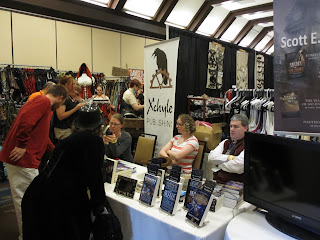It was an interesting year for me, filled with quite a few firsts. I published my first fiction way back in 1995, but only got serious about writing in the past two years. Without further ado, here's the successes.
My log also shows six rejections for the year, so it looks like my accept/reject ratio isn't that bad. I'm not a full time writer, so there are limits to how much I can have going at once. Given that this is all from the evenings and weekends not taken up by family, church, or career, I'd have to say it's not bad as entries into the writer community go.
I've been blessed to meet and become at least casual friends with a large number of fellow-writers both local and remote. The local writer community that I bump into at conventions and events is supportive beyond what I could have imagined or expected.
Picked up more books, and reviewed more books than any other year that I can recall (but I'm not counting when I raided my dad's library all through my teen years).
For the next year, my goals are to:
- A steampunk short story "Revolutionary" was published in the anthology Steel & Bone by Xchyler Publishing.
- A short urban fantasy story "The Blight" was announced as a finalist in the Dragon Comet writing contest, with winners to be announced this coming February at LTUE.
- A horror story "Exposure Therapy" was accepted for an anthology to be released, also at LTUE.
- I won NaNoWriMo. For those who aren't familiar, that means I wrote a minimum of 50K words toward completing a novel. I posted about it earlier. That novel is at 73K now, and is going through edits.
- I have four short stories currently out waiting for a response, three of which I can query next week to see what the status is.
My log also shows six rejections for the year, so it looks like my accept/reject ratio isn't that bad. I'm not a full time writer, so there are limits to how much I can have going at once. Given that this is all from the evenings and weekends not taken up by family, church, or career, I'd have to say it's not bad as entries into the writer community go.
I've been blessed to meet and become at least casual friends with a large number of fellow-writers both local and remote. The local writer community that I bump into at conventions and events is supportive beyond what I could have imagined or expected.
Picked up more books, and reviewed more books than any other year that I can recall (but I'm not counting when I raided my dad's library all through my teen years).
For the next year, my goals are to:
- Attend four conferences (probably LTUE, FanX, Salt Lake Comic Con and Salt City Steamfest) to hobnob.
- Recruit four new beta readers to add to the pool. This assumes I will also be a beta reader for others.
- Publish Crystal King.
- Submit four short stories to open calls or contests like web publishers, or
- Get invited to an anthology.
Some of those should be pretty easy, and some will require me to really stick my neck out and plow through undiscovered country, since like many authors, I'm naturally reclusive. If you see me, feel free to drag me out of my shell and encourage me to jump into the thick of things. I will try not to be grumpy about it.






































